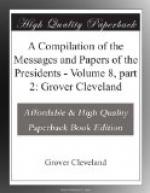The passage of this bill has been urged upon the ground that the election of members of Congress is a matter which concerns the States alone; that these elections should be controlled exclusively by the States; that there are and can be no such elections as national elections, and that the existing law of the United States regulating the Congressional elections is without warrant in the Constitution.
It is evident, however, that the framers of the Constitution regarded the election of members of Congress in every State and in every district as in a very important sense justly a matter of political interest and concern to the whole country. The original provision of the Constitution on this subject is as follows (sec. 4, Art. I):
The times, places, and manner of holding elections for Senators and Representatives shall be prescribed in each State by the legislature thereof; but the Congress may at any time, by law, make or alter such regulations, except as to the places of choosing Senators.
A further provision has been since added, which is embraced in the fifteenth amendment. It is as follows:
SEC. 1. The right of citizens of the United States to vote shall not be denied or abridged by the United States or by any State on account of race, color, or previous condition of servitude.
SEC. 2. The Congress shall have power
to enforce this article
by appropriate legislation.
Under the general provision of the Constitution (sec. 4, Art. I) Congress in 1866 passed a comprehensive law which prescribed full and detailed regulations for the election of Senators by the legislatures of the several States. This law has been in force almost thirteen years. In pursuance of it all the members of the present Senate of the United States hold their seats. Its constitutionality is not called in question. It is confidently believed that no sound argument can be made in support of the constitutionality of national regulation of Senatorial elections which will not show that the elections of members of the House of Representatives may also be constitutionally regulated by the national authority.
The bill before me itself recognizes the principle that the Congressional elections are not State elections, but national elections. It leaves in full force the existing statute under which supervisors are still to be appointed by national authority to “observe and witness” the Congressional elections whenever due application is made by citizens who desire said elections to be “guarded and scrutinized.” If the power to supervise in any respect whatever the Congressional elections exists under section 4, Article I, of the Constitution, it is a power which, like every other power belonging to the Government of the United States, is paramount and supreme, and includes the right to employ the necessary means to carry it into effect.




